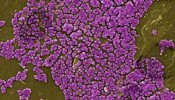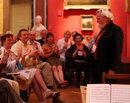 Thoroughbred horse owners now have a new tool to predict howtheir nags will perform on the track. Last week at the IrishThoroughbred Breeders’ Association Expo in County Kildare, anew company called Equinome rolled out a €1000 DNA test of amuscle factor derived from the Horse Genome Project.
Thoroughbred horse owners now have a new tool to predict howtheir nags will perform on the track. Last week at the IrishThoroughbred Breeders’ Association Expo in County Kildare, anew company called Equinome rolled out a €1000 DNA test of amuscle factor derived from the Horse Genome Project.
Muscle growth is governed by myostatin, a protein that determineswhether an animal has compact muscles tuned for rapid sprintsor a leaner body suited for endurance. Company co-founder EmmelineHill, left, a genetics researcher at University College Dublin,and colleagues reported last month in PLoS ONE that horses withtwo copies of the myostatin-suppressing C variant of the genewere more likely to win short races up to 6.5 furlongs (1.3kilometers), whereas horses with two T variants did better inraces up to 13.5 furlongs.
Horse Genome Project coordinator Ernest Bailey of the Universityof Kentucky, Lexington, notes that breeders have adopted genetictests for paternity, coat color, and diseases but that performanceprediction is new ground. Hill says breeders have been askingabout genes for temperament. That’s not yet in the offing, shesays, but “we’re investigating gene associations with [other]parameters, such as aerobic capacity.”
See the original Random Sample on Science’s website: [html] or as it appeared in print: [pdf]
This story also appeared as a ScienceNOW: [html]


 Charles Darwin may have had his biggest impact on biology, but he began his scientific career as a geologist. So it’s appropriate that earlier this year, retired geologist John Ramsay, who had long studied the famed biologist’s life, accepted a commission to compose a Darwin-themed string quartet.
Charles Darwin may have had his biggest impact on biology, but he began his scientific career as a geologist. So it’s appropriate that earlier this year, retired geologist John Ramsay, who had long studied the famed biologist’s life, accepted a commission to compose a Darwin-themed string quartet.